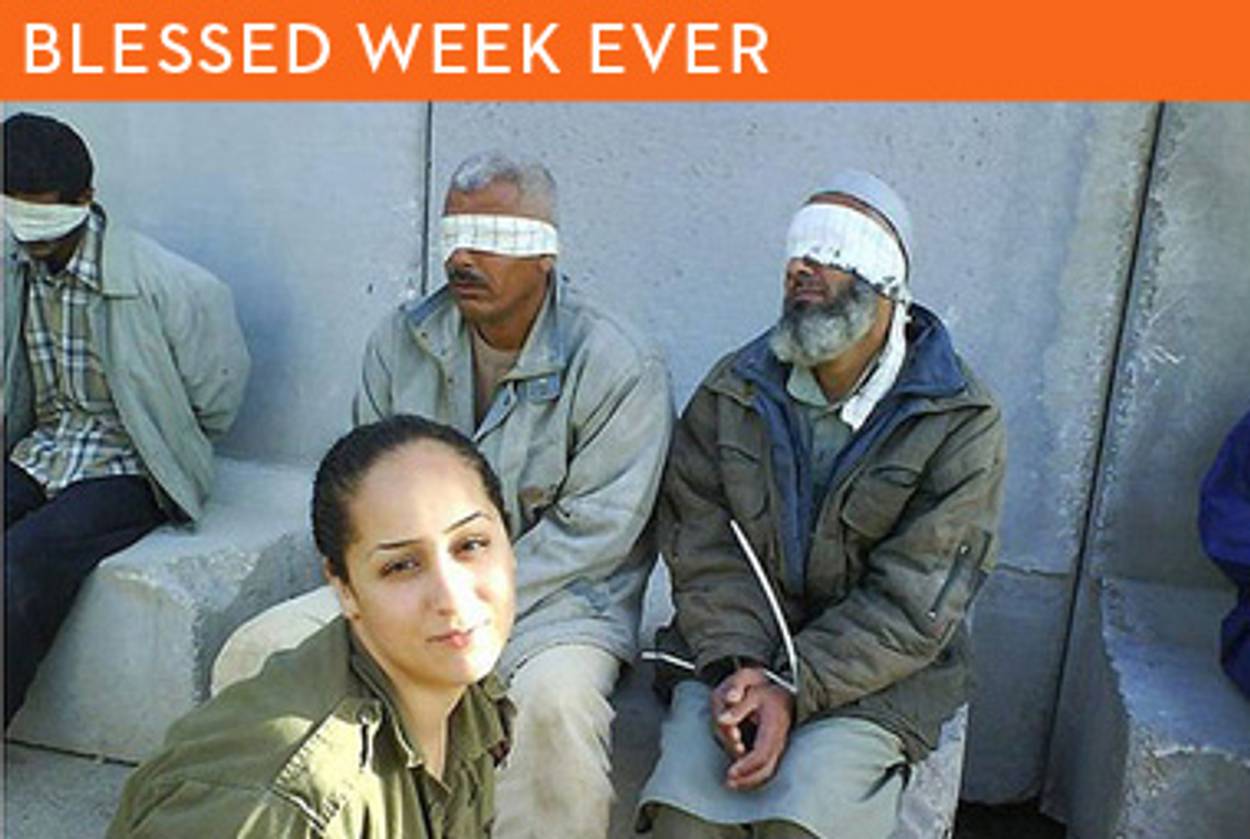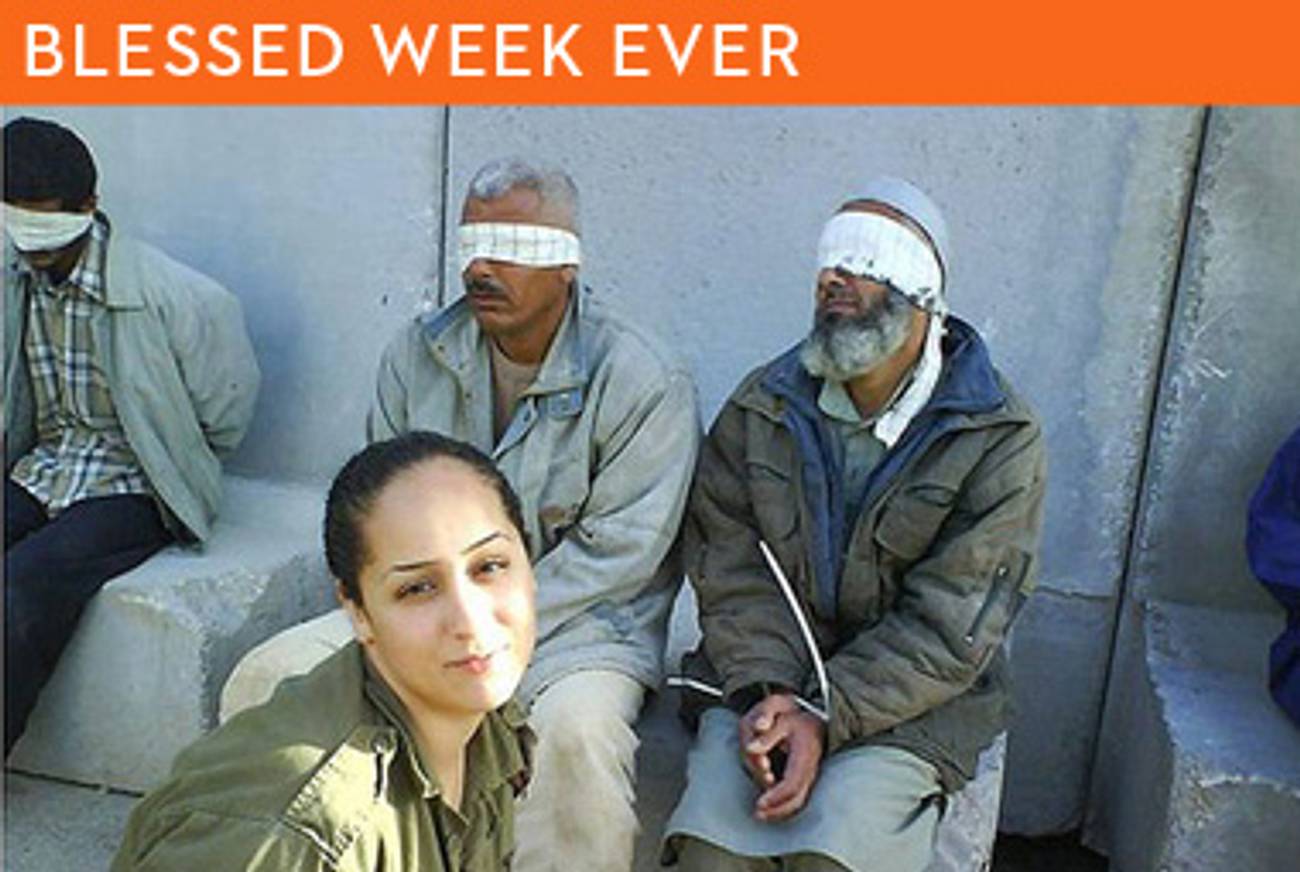Value Judgment
A haftorah of dark times and core beliefs




Earlier this week, news outlets around the world circulated candid snapshots of a young Israeli soldier sitting next to a number of bound and blindfolded Palestinian men and looking at the camera with a coy grin. The soldier, Eden Abergil, had posted the photos to Facebook, in a personal album titled “The Army: The most beautiful time in my life… :)” An Israeli blogger discovered them there; it took less than 48 hours for Abergil to become known around the world as the Israeli Lynndie England.
At first, I was unwilling to pay the story any serious attention. Having served in the Israel Defense Forces, I know that when very young men and women are placed under very extreme circumstances and subjected to very great pressures, some are likely to act in regrettable ways. And the misdeeds of one soldier no more taint the IDF than the shenanigans of one drunken student, say, tarnish the reputation of his or her college.
And then I heard Abergil speak.
Reached for comment by the Israeli website Ynet, Abergil expressed no remorse. The only regret she had, she told the reporter, was having served in an “ungrateful” army that now, after the photos came to light, dishonorably discharged her of reserve duty. (Abergil completed her mandatory service last year.) To her many detractors around the world, she had this to say: “These people, they want world peace, right? They’re against me at the moment because they want world peace and I’m ruining for them this streak of planning for world peace, all this bullshit. … You’re hating a Jewish woman who all she did was take this lousy picture with some Arab.” An Arab, Abergil insisted, she had never mistreated: “We treated them nicely,” she said of her bound prisoners, “we cracked jokes with them, and they’d say words in Hebrew.” Not that she has any problem with mistreating, even murdering, Arabs: Commenting on the now-infamous photograph on her own Facebook page, Abergil wrote: “I hate Arabs, and wish them everything that’s bad, and I would happily kill them, even massacre them.”
Abergil, of course, is very young and should therefore be granted a touch of compassion. But her words reflect a fundamental disrespect for human life and dignity, a disrespect that no one who served as a soldier could ever be excused for harboring. Abergil, it is not surprising, thinks otherwise; toward the end of her interview, she suggested that her critics would change their minds were they to put themselves in her dusty boots. “All those who comment,” she said, “let them serve one day in the territories.”
I have. More than one day. In the West Bank, in Gaza, in Lebanon. I served because I had to, but also because I believed the exact opposite of what Abergil does. I believed that the army’s supreme goal was to provide security and that security’s ultimate end was peace, believed that being a solider meant having power and that having power demanded caution and consideration and responsibility. And I was proud of the IDF for swiftly punishing Abergil but distraught because I realized she wasn’t alone, that there were many like her in Israel who perceive their nation as a blameless victim and are ready, in a cruel twist of fate, to dispel this perceived victimhood with excessive force. Abergil herself put it best: “We will always be attacked,” she told her interviewer. “Whatever we do, we will always be attacked.” Might as well tie up those Palestinians, then, and snap a happy picture: The world is going to hate us anyway.
With a heart heavy with shame, I sought solace in this week’s haftorah, the sixth of seven haftarot of consolation, read between Tisha B’Av and Rosh Hashanah. Fortunately, shame was on Isaiah’s mind as well: “Fear not,” said the prophet, “for you shall not be ashamed, and be not embarrassed for you shall not be put to shame, for the shame of your youth you shall forget.”
It’s an odd sentiment. A prophet seeking to console his people may promise to forgive them their sins, or alleviate their pain, or end their suffering. But Isaiah, a Jewish seer through and through, speaks of shame. Shame, he realizes, is more powerful than pain, more prominent than sin. Shame is self-induced, and it comes with the searing sensation of having failed to live up to one’s own standards. If we let God down, he will forgive us; that, as Heinrich Heine so poignantly put it, is his job. But if we disappoint ourselves, we won’t forget so quickly. The only solution, Isaiah realizes, is to erase every trace of shame; unfortunately, such an exuberant bit of clemency can only come in the days of the Messiah.
In the meantime, it’s up to us to learn to live with shame and hope we can harness its untamable energies toward deserving ends. I can only pray that somewhere beneath the hurt and the confusion and the bluster, Eden Abergil feels a hint of shame. If she does, she’s headed in the right direction. Isaiah could show her the way.
Liel Leibovitz is a senior writer for Tablet Magazine and a host of the Unorthodox podcast.
Liel Leibovitz is editor-at-large for Tablet Magazine and a host of its weekly culture podcast Unorthodox and daily Talmud podcast Take One. He is the editor of Zionism: The Tablet Guide.